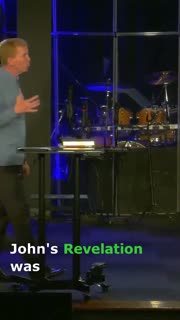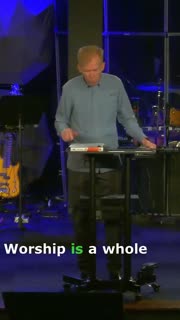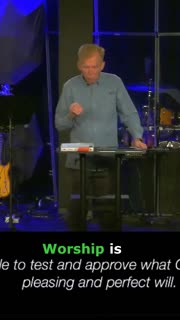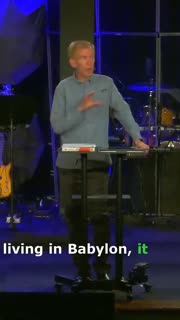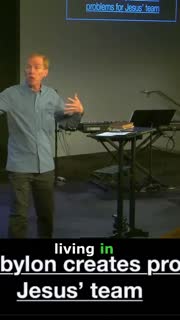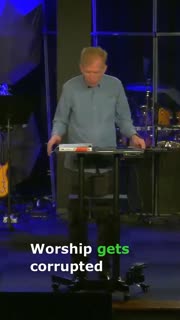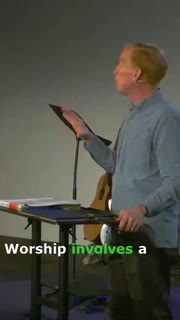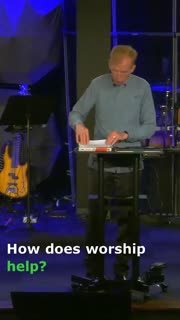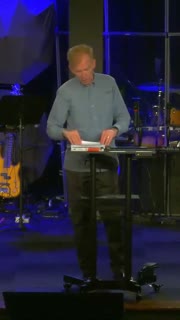Living Faithfully in a Babylonian World
Devotional
Sermon Summary
Bible Study Guide
Sermon Clips
### Quotes for Outreach
1. "John's Revelation was not given for speculation. So we could predict the future. But so that we could live faithfully. Today. And any day. It was written to actual churches. Seven of them. And they're named in the first couple chapters of this book." (19 seconds)
2. "When you live in a place. For long enough. You begin to be impacted. And you begin to absorb. The place where you live. I'll give you an example. Of a younger sister. Who like me grew up in the Midwest. Speaking Midwesternese. Whatever that happens to be. But she's lived in Texas for decades now. And when we get together for family reunions. I'm like. Oh you don't talk like the rest of us. Because she has a very pronounced deep Texas drawl. Where did that come from? It didn't come from growing up. In the Midwest. It came because she began to absorb. Part of the space that she was living in." (43 seconds)
3. "Worship is a whole body. Whole voice. Whole mind. And whole voice. Life lived in gratitude to God for redemption. And a whole life surrendered to the Lamb who was slain. So that we could have life. Right? It's a counter action to Babylon. Which is where we live. John's saying this is how you push back against the darkness and the dehumanization of Babylon. You have to come back to worship. You have to come back to a place where you're seeing God on his throne. Even while we live in Babylon." (39 seconds)
4. "Worship is our warfare. Worship is our warfare. This is how we combat Babylon, Babylon, not by taking up weapons, unless our weapon happens to be worship. You see how this works? This is why this is so important. This is a surprising strategy for how do we actually live different. We do it because we worship, and worship as a habit begins to change and form us into people who see the world with a different set of eyes." (34 seconds)
5. "Living in Babylon, it will always create problems and challenges for Jesus' team, but there is a way to counteract that, to overcome Babylon, and it's a lifestyle of worship. Worship is not just what happens for an hour on Sunday. Worship is how we live our lives." (19 seconds)
### Quotes for Members
1. "Living in Babylon. Creates problems for people. Who are trying to follow Jesus. Who are part of team lamb. As we are calling it. Problems are identified. And John begins to relate some of those. In these letters. So I am going to just take a few snippets. Out of the letters. Because we are not going to read those whole two chapters. You can look them up later if you want. In Revelation 2 and 3. He is writing to these churches. That are spread throughout the region. Through what is now the area of Turkey. But was called Asia Minor." (30 seconds)
2. "Worship gets corrupted when the wrong things. Are put at the center of our lives. The Roman Empire. In the day that John wrote this. Was all about Rome. And all about the emperor. And if you wanted to be a good Roman citizen. You would pay homage. To the emperor. And you would have these idols. And you would worship. And you would pay. You know. Do all the things that good Roman citizens do. And essentially worshiping. The emperor. Now we're not likely to worship an emperor today. But we are susceptible. Catch this. To giving our first allegiance. To something other than God. It could be a nation. could be a party. It could be a leader. could be a cause. It could be an appetite. Or a desire. These things. When they get put at the center of our life. When they are first allegiance. They become idols. They become that thing. That defines our identity." (75 seconds)
3. "Worship involves a lot more than just singing. Right? It's crying out. It's speaking. It's shouting hallelujah. It's rejoicing. And even more. What's more. It's not just something passive that happens to me when I happen to sit in a place like this. It involves bowing down and tossing crowns to God. It involves encircling the throat of God. And standing. And holding palm branches. And using instruments to make music. And to make noise. And saying amen. As one writer put it. Worship is a whole body. Whole voice. Whole mind. And whole voice. Life lived in gratitude to God for redemption. And a whole life surrendered to the Lamb who was slain. So that we could have life." (39 seconds)
4. "How does worship help? Well. To quote a famous philosopher. A social imaginary is your reality. What does that mean? The things that you perceive and imagine in your mind begin to become your reality. So when you and I begin to focus on God on the throne. And the slain lamb next to him who overcame all this. That begins to become our reality. That's how we experience the world. As one author put it. The social imaginary is the creative and symbolic dimension. Through which humans create their way of living together. And of representing their collective life. What you imagine. And we talked about this already. It takes imagination to read John well. What you imagine is going to become your reality. How you interact with people around you. The decisions that you make. The values that you live out. Are all going to be shaped by what you imagine." (58 seconds)
5. "John's readers. The first hearers of this message. Lived in the Roman Empire. Where Caesar was worshipped. And where his military might. And his opulence. And his exploitation of human bodies. And on and on. This was just the standard way of doing things. This is how business was done. To opt out of paying allegiance to Rome. And to the emperor. It came at a cost. To be a dissident in that day. As in any day. Comes with a price. You will be ostracized. You will be left out of certain circles. You will face consequences. And into that reality. This is another one of John's songs. So let me share this with you. Revelation 15 starting in verse 7. Revelation 11 starting in verse 15. I am sorry. The seventh angel. Again we don't have time to get into all the angels. And the bowls and the trumpets. We did a little bit of that last week. The seventh angel sounded the trumpet. And there were loud voices in heaven. Which said. The kingdom of this world. Remember this is a message going to people. Who lived under the kingdom of Rome. The kingdom of this world. Has become the kingdom of our Lord. And of his Messiah. And he will reign forever and ever." (84 seconds)
Ask a question about this sermon
1. "John's Revelation was not given for speculation. So we could predict the future. But so that we could live faithfully. Today. And any day. It was written to actual churches. Seven of them. And they're named in the first couple chapters of this book." (19 seconds)
2. "When you live in a place. For long enough. You begin to be impacted. And you begin to absorb. The place where you live. I'll give you an example. Of a younger sister. Who like me grew up in the Midwest. Speaking Midwesternese. Whatever that happens to be. But she's lived in Texas for decades now. And when we get together for family reunions. I'm like. Oh you don't talk like the rest of us. Because she has a very pronounced deep Texas drawl. Where did that come from? It didn't come from growing up. In the Midwest. It came because she began to absorb. Part of the space that she was living in." (43 seconds)
3. "Worship is a whole body. Whole voice. Whole mind. And whole voice. Life lived in gratitude to God for redemption. And a whole life surrendered to the Lamb who was slain. So that we could have life. Right? It's a counter action to Babylon. Which is where we live. John's saying this is how you push back against the darkness and the dehumanization of Babylon. You have to come back to worship. You have to come back to a place where you're seeing God on his throne. Even while we live in Babylon." (39 seconds)
4. "Worship is our warfare. Worship is our warfare. This is how we combat Babylon, Babylon, not by taking up weapons, unless our weapon happens to be worship. You see how this works? This is why this is so important. This is a surprising strategy for how do we actually live different. We do it because we worship, and worship as a habit begins to change and form us into people who see the world with a different set of eyes." (34 seconds)
5. "Living in Babylon, it will always create problems and challenges for Jesus' team, but there is a way to counteract that, to overcome Babylon, and it's a lifestyle of worship. Worship is not just what happens for an hour on Sunday. Worship is how we live our lives." (19 seconds)
### Quotes for Members
1. "Living in Babylon. Creates problems for people. Who are trying to follow Jesus. Who are part of team lamb. As we are calling it. Problems are identified. And John begins to relate some of those. In these letters. So I am going to just take a few snippets. Out of the letters. Because we are not going to read those whole two chapters. You can look them up later if you want. In Revelation 2 and 3. He is writing to these churches. That are spread throughout the region. Through what is now the area of Turkey. But was called Asia Minor." (30 seconds)
2. "Worship gets corrupted when the wrong things. Are put at the center of our lives. The Roman Empire. In the day that John wrote this. Was all about Rome. And all about the emperor. And if you wanted to be a good Roman citizen. You would pay homage. To the emperor. And you would have these idols. And you would worship. And you would pay. You know. Do all the things that good Roman citizens do. And essentially worshiping. The emperor. Now we're not likely to worship an emperor today. But we are susceptible. Catch this. To giving our first allegiance. To something other than God. It could be a nation. could be a party. It could be a leader. could be a cause. It could be an appetite. Or a desire. These things. When they get put at the center of our life. When they are first allegiance. They become idols. They become that thing. That defines our identity." (75 seconds)
3. "Worship involves a lot more than just singing. Right? It's crying out. It's speaking. It's shouting hallelujah. It's rejoicing. And even more. What's more. It's not just something passive that happens to me when I happen to sit in a place like this. It involves bowing down and tossing crowns to God. It involves encircling the throat of God. And standing. And holding palm branches. And using instruments to make music. And to make noise. And saying amen. As one writer put it. Worship is a whole body. Whole voice. Whole mind. And whole voice. Life lived in gratitude to God for redemption. And a whole life surrendered to the Lamb who was slain. So that we could have life." (39 seconds)
4. "How does worship help? Well. To quote a famous philosopher. A social imaginary is your reality. What does that mean? The things that you perceive and imagine in your mind begin to become your reality. So when you and I begin to focus on God on the throne. And the slain lamb next to him who overcame all this. That begins to become our reality. That's how we experience the world. As one author put it. The social imaginary is the creative and symbolic dimension. Through which humans create their way of living together. And of representing their collective life. What you imagine. And we talked about this already. It takes imagination to read John well. What you imagine is going to become your reality. How you interact with people around you. The decisions that you make. The values that you live out. Are all going to be shaped by what you imagine." (58 seconds)
5. "John's readers. The first hearers of this message. Lived in the Roman Empire. Where Caesar was worshipped. And where his military might. And his opulence. And his exploitation of human bodies. And on and on. This was just the standard way of doing things. This is how business was done. To opt out of paying allegiance to Rome. And to the emperor. It came at a cost. To be a dissident in that day. As in any day. Comes with a price. You will be ostracized. You will be left out of certain circles. You will face consequences. And into that reality. This is another one of John's songs. So let me share this with you. Revelation 15 starting in verse 7. Revelation 11 starting in verse 15. I am sorry. The seventh angel. Again we don't have time to get into all the angels. And the bowls and the trumpets. We did a little bit of that last week. The seventh angel sounded the trumpet. And there were loud voices in heaven. Which said. The kingdom of this world. Remember this is a message going to people. Who lived under the kingdom of Rome. The kingdom of this world. Has become the kingdom of our Lord. And of his Messiah. And he will reign forever and ever." (84 seconds)
